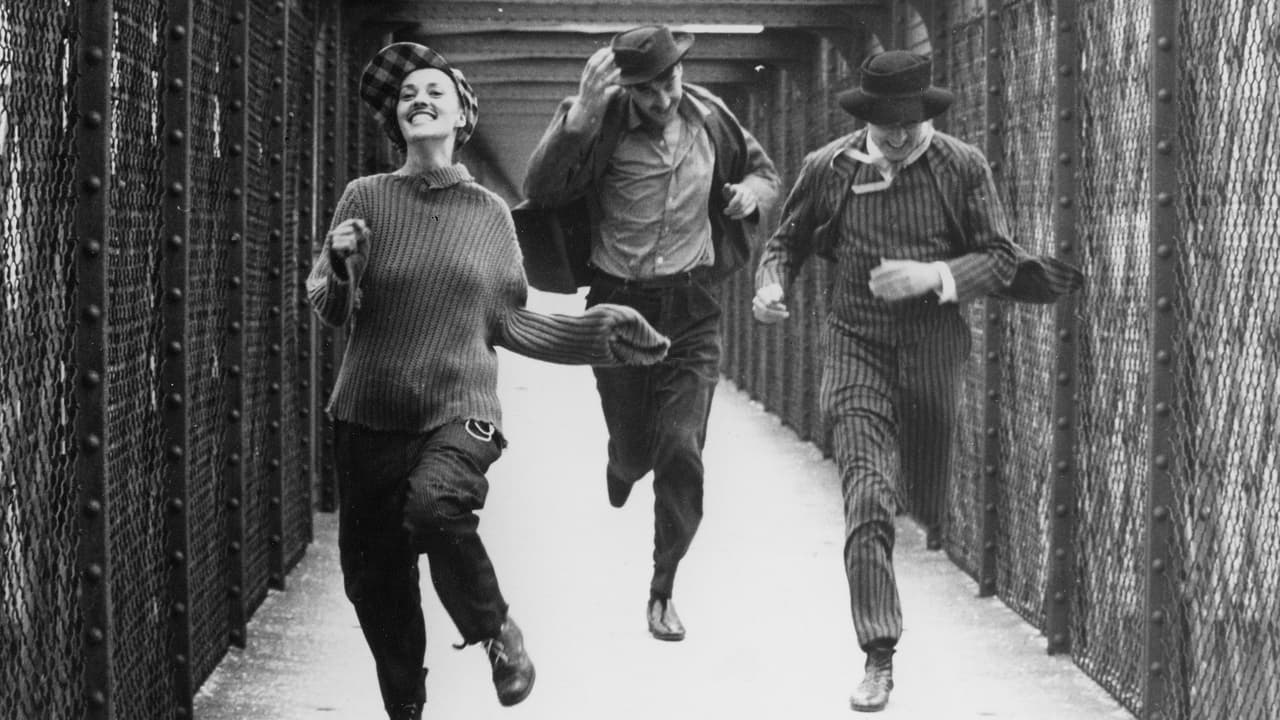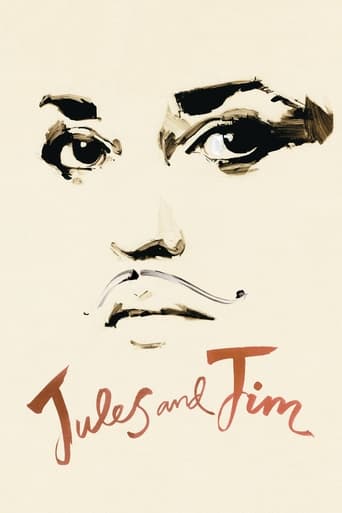

Beautiful but rather pointless French "nouvelle vague" (new wave) exercise. I was in high school when this film came out, and much was made of it by the critics. I never found Jeanne Moreau as beautiful as others did, but having seen this film today for the first time, I can say she looked terrific. Nevertheless I believe that her character was that of a spoiled, selfish, never-to-be-redeemed woman who can't have what she wants and ends up in the drink. As for the two protagonists, they were just plain immature and were never going to grow up. I hope that little Sabine grew up to be healthy. Sadly we saw nothing about her during the last part of the movie. What a waste of two hours. I'll take "Last Year in Marienbad" but not this tedious mess.
... View MoreThe story of two friends, Jules and Jim. They meet in Paris before World War 1 and strike up a friendship. Jules falls in love with the enigmatic, volatile Catherine. However, Jim also has feelings for her... I really don't know why this is regarded so highly. The story is mostly quite dull, the characters are not that engaging, the ending is abrupt and there isn't much point to the whole thing. Performances are unconvincing and a tad irritating.It is quite morally progressive for 1962, and the relationships involved are quite liberal for the time, so maybe that's what all the fuss is about.
... View MoreI'd heard of this film over the years with an element of genius assigned to it, but as I viewed it the other day I was genuinely underwhelmed. The principal characters simply don't strike me as real people. They exist with virtually no reaction to situations that would make ordinary people respond with emotions ranging from jealousy and insecurity to outright rage and hatred. In fact, at the picture's finale I began wondering whether there was an element of mental illness in the character of Catherine (Jeanne Moreau). It's one thing to be driven to suicide by severe depression, but that didn't seem to be a factor in Catherine's make up. And if she wanted to kill herself on a whim, why commit murder at the same time by taking her lover Jim (Henri Serre) with her? It's not like he had a voice in the decision.Leading up to that, the whole relationship among the principals seemed rather surreal. Drawn into an affair with Catherine long after he had been best friends with Jules (Oskar Werner), Jim himself seems to have a directionless life following the Great War. He's about ready to propose to his girlfriend Gilberte (Vanna Urbino) and instead is drawn into an unsatisfying relationship with Catherine, who makes no secret of having regular dalliances with other men as well. For her part Catherine leaves Jules for a period of six months, and he's left to care for himself and their young daughter in the interim.Am I missing something here? 'Normal' people don't live this way, but then again, normal may have been redefined over the past four decades since this film came out. But there was just no warming up to these characters as the film progressed and it left me with just a perverse reaction when it was all over. I would try again, but my instincts are usually correct the first time.
... View MoreJules et Jim is often venerated as one of the greatest films of the nouvelle vague movement. Sadly, this is not the case. Indeed, it is not even close to being Truffaut's best (Shoot the Piano Player, for one, was a more interesting and daring film, with deeper psychological insight.) For all of its flaws though, this film has an irrepressible energy and vitality that reflects the youthful exuberance of its three leads. Indeed, it is only at the end, when Catherine's constant vacillation between lovers becomes tiresome to the audience, does one start to lose interest.The film can be read as a story of male solidarity that not even a war between nations or the affairs of an amoral woman can undermine.Jules and Jim are both intellectual characters, from different cultural backgrounds but united in their interests. Despite their intellectual inclinations they are far from being insular academics (they are, indeed, more inclined to be writers or poets) and live exuberant lives in early twentieth century Paris, until they encounter Catherine, a rare woman who can actually match them and, indeed, out do them in their joie de vivre. Hers, though, is an amoral outlook and though she uses men in a predatory fashion they are both happy to accommodate her.She is unable to make a commitment to either and can only split their friendship by destroying herself and Jim in the film's climax. Her decision to commit murder-suicide seems as spontaneous as every other decision in her life and it is just as theatrical -she must always have an audience before her. She is potentially a cold character at heart as she is so selfish but, to Truffaut's credit he brings a great deal of warmth to this tale and that is, perhaps, its greatest achievement.The film's exuberant feel is captured in it cinematography. By using hand-held cameras on location, there is a realness and energy to this production that is mirrored in the strong acting by Moreau and the great Oskar Werner.Small scenes that are otherwise pointless to the plot, give this film a lyrical quality and emphasise Catherine's spontaneous character. These include her dive into the river, which foreshadows the film's ending and the famous scene of the race, during which the motion of the camera mirrors the movements of the actors.There is use of farcical humour as in all nouvelle vague productions and a use of what is obviously stock footage to emphasise that the film is an artificial construction by the auteur, not an illusion of real life.The film was probably set in the early twentieth century time period both to capture the turmoil of the era and to add shock value. The idea of people living such unconventional lifestyles would have been even more incongruous in the Paris of 1912 than in the Paris of 1962.Despite Truffaut's use of these radical new techniques and the shocking, unconventional nature of the love affair at the heart of the story, interest wanes towards the end. Catherine is, ultimately, a superficial character and even her exuberance cannot carry the film. As noted above, her energy wears out the audience and her inability to make a decision does not captivate as Hamlet or any post-modern hero would; it merely frustrates towards the end. Her death being the only way she can resolve her trivial dilemmas is a contrived ending and one audiences are unlikely to find either satisfactory or subversive in this modern age.In summary, this is an important nouvelle vague film and maybe even essential viewing for those of us who love European cinema but it is not a great one. It ends up being as superficial as the character being studied and all the energy, joy and lightness in the world cannot disguise that fact.
... View More